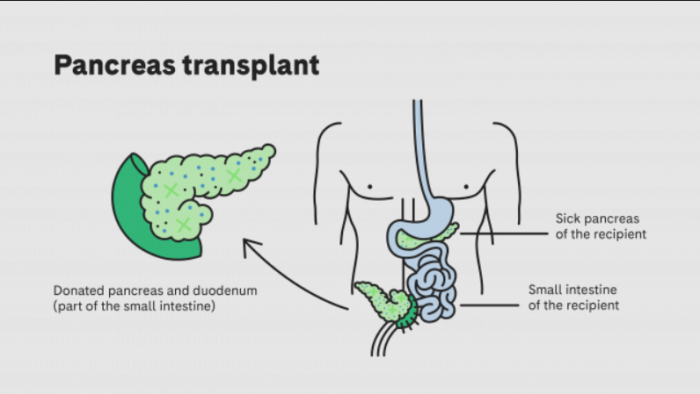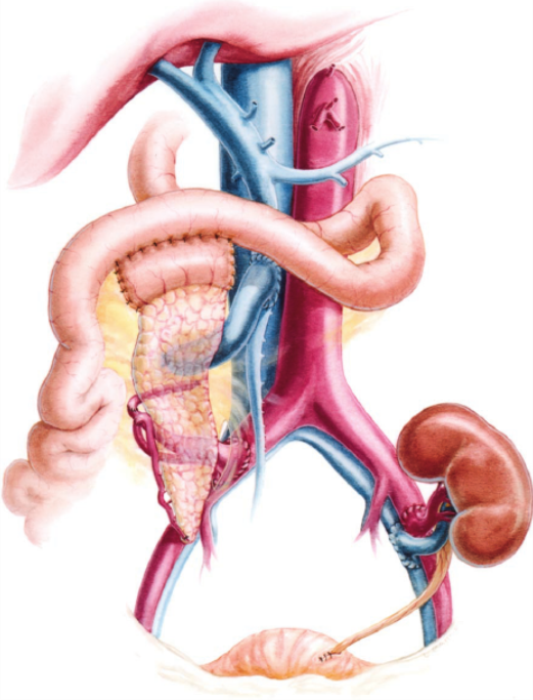Overview of Pancreas Transplant Surgery: Expectations and Complications
Pancreas transplant surgery aims to restore insulin production in patients with severe diabetes or pancreatic disease. While this procedure can significantly improve quality of life, it is essential to understand that complications can arise, impacting both short-term recovery and long-term outcomes. Common complications include infection, rejection of the transplanted organ, and gastrointestinal issues, which can vary based on individual patient factors.
Common Post-Surgery Complications After Pancreas Transplant
After pancreas transplant surgery, patients may face several complications, including infections, bleeding, and issues related to the surgical site. Additionally, organ rejection is a critical concern, as the body may recognize the new pancreas as foreign. Proper monitoring and management of these complications are vital to ensuring a successful recovery and maintaining the function of the transplanted pancreas.

Understanding Infection Risks After Pancreas Transplantation
Infection is a significant risk after pancreas transplantation due to the immunosuppressive medications prescribed to prevent organ rejection. These drugs lower the body’s natural defenses, making patients more susceptible to bacterial, viral, and fungal infections. It’s crucial for patients to recognize early signs of infection, such as fever or unusual discharge, and seek medical attention promptly.
The Role of Immunosuppressive Medications in Post-Transplant Complications
Immunosuppressive medications are essential in preventing organ rejection after a pancreas transplant. However, these drugs can lead to various complications, including increased susceptibility to infections, metabolic disorders, and potential damage to other organs. Careful monitoring and dosage adjustments are necessary to balance the benefits of preventing rejection against the risks of these medications.
Pancreas Transplant Rejection: Types, Symptoms, and Management
Rejection of a transplanted pancreas can occur in several forms: acute, chronic, and hyperacute. Symptoms may include elevated blood sugar levels, abdominal pain, and fever. Early detection is crucial for effective management, which may involve adjusting immunosuppressive therapy or other medical interventions to prevent permanent damage to the transplant.
Gastrointestinal Issues Post-Pancreas Transplant: Causes and Solutions
Patients may experience gastrointestinal complications after a pancreas transplant, such as nausea, diarrhea, or delayed gastric emptying. These issues can arise from the surgical procedure itself or as a side effect of immunosuppressive medications. Dietary adjustments and medications can help alleviate these symptoms, and working closely with a healthcare provider is essential for optimal management.
Blood Clots After Pancreas Transplant: Prevention and Treatment
Blood clots are a potential complication following pancreas transplant surgery, particularly in the legs or lungs. Patients are often monitored for signs of thrombosis, and preventive measures such as anticoagulant medications and early mobilization can significantly reduce the risk. If a blood clot is detected, immediate treatment is critical to prevent further complications.
Nutritional Challenges Following Pancreas Transplant Surgery
After pancreas transplant surgery, patients may face nutritional challenges due to changes in digestion and absorption. It is vital to follow a well-balanced diet and consult a nutritionist to ensure adequate nutrient intake. Adjustments may be necessary as the body adapts to the new pancreas, and ongoing dietary management can help maintain optimal health.
Managing Diabetes After Pancreas Transplant: What Changes?
One of the primary goals of a pancreas transplant is to eliminate insulin dependence for patients with diabetes. However, some individuals may still experience fluctuations in blood sugar levels post-surgery. Ongoing monitoring of blood glucose is essential, and patients may need to adjust their lifestyle and dietary habits to maintain stable levels and prevent complications.
Psychological Effects and Mental Health Challenges Post-Transplant
The journey of undergoing a pancreas transplant can take a toll on mental health. Patients may experience anxiety, depression, or adjustment disorders as they navigate their recovery and the changes that come with a new organ. Support groups and mental health professionals can provide essential resources to help patients cope with these emotional challenges.
Post-Surgery Pain Management Strategies After Pancreas Transplant
Pain management is a critical aspect of recovery after pancreas transplant surgery. Patients may experience surgical site pain or discomfort from inflammation. Effective pain management strategies, including medications, physical therapy, and relaxation techniques, are crucial to enhance recovery and improve the overall patient experience.
The Importance of Follow-Up Care in Preventing Complications
Regular follow-up care is essential for patients after a pancreas transplant to monitor for potential complications and assess the health of the transplanted organ. These visits allow healthcare providers to make necessary adjustments to medications and address any emerging issues. Adhering to a follow-up schedule can significantly impact the long-term success of the transplant.
Kidney Function Monitoring Post-Simultaneous Kidney-Pancreas Transplant
For patients undergoing a simultaneous kidney-pancreas transplant, monitoring kidney function is crucial. Both organs are interconnected in terms of health, and potential complications can arise that affect their functioning. Regular check-ups and lab tests are necessary to ensure that both the pancreas and kidney remain healthy and functioning optimally.

Understanding Pancreatic Fistulas and Their Impact on Recovery
A pancreatic fistula is an abnormal connection that can develop after transplant surgery, leading to complications such as fluid leakage. This condition can delay recovery and require additional interventions to manage. Recognizing the signs early and having a treatment plan can mitigate the impact of this complication on the healing process.
Pancreas Transplant and Urinary Complications: What to Expect
Urinary complications may occur after a pancreas transplant, especially in patients who have undergone a simultaneous kidney transplant. Issues like urinary tract infections or changes in urinary function can arise. Maintaining hydration and being aware of urinary symptoms can help manage and prevent these complications.
Delayed Graft Function: Causes and Management Strategies
Delayed graft function refers to the period when the transplanted pancreas does not begin to function immediately after surgery. Causes can include ischemia or pre-existing pancreatic damage. Management strategies focus on close monitoring and supportive care to help the pancreas regain its function as quickly as possible.
The Role of Physical Therapy in Recovery After Pancreas Transplant
Physical therapy plays a crucial role in the recovery process following pancreas transplant surgery. It helps patients regain strength, improve mobility, and manage pain. Engaging in a tailored rehabilitation program can enhance recovery outcomes and promote a smoother transition back to daily activities.
Benefits of Pancreas Transplant After Surgery
A successful pancreas transplant can significantly improve a patient's quality of life, often eliminating the need for insulin therapy and preventing further complications of diabetes. Learn more about the transformative benefits that follow this life-saving surgery, and how patients regain their independence and long-term health.
Emotional Resilience and Coping Mechanisms for Transplant Recipients
Building emotional resilience is vital for transplant recipients to cope with the physical and psychological challenges they may face. Patients can benefit from developing coping mechanisms, such as mindfulness practices, support groups, and therapy, which can help manage stress and improve overall well-being.
Changes in Reducing Post-Transplant Complications
Adopting a healthy lifestyle is vital for reducing the risk of complications after pancreas transplantation. Patients are encouraged to maintain a balanced diet, engage in regular physical activity, and avoid harmful substances. These lifestyle changes can enhance recovery and promote the long-term success of the transplant.
Best Pancreas Transplant in India
The Best Pancreas Transplant in India is performed by skilled transplant surgeons who utilize advanced techniques to restore pancreatic function, providing patients with a tailored treatment plan to improve their quality of life and manage diabetes effectively.
Best Pancreas Transplant Hospitals in India
The Best Hospitals for Pancreas Transplant in India are equipped with state-of-the-art transplant facilities and multidisciplinary care teams, ensuring comprehensive pre- and post-transplant care to support a smooth recovery process.
Pancreas Transplant Cost in India
When considering the Pancreas Transplant Cost in India, patients benefit from transparent, affordable pricing at leading transplant centers, which offer high-quality, cost-effective options for managing complex pancreatic conditions.
Best Pancreas Transplant Doctors in India
The Best Pancreas Transplant Doctors in India are highly experienced in performing complex transplants, providing personalized care and dedicated follow-up support to maximize transplant success and patient recovery.
Coping with Chronic Fatigue After Pancreas Transplant Surgery
Chronic fatigue is a common issue for patients recovering from pancreas transplant surgery, often resulting from the surgical procedure and medication side effects. It is important for patients to listen to their bodies and gradually increase activity levels while incorporating rest periods to manage fatigue effectively.
Managing Hypertension in Post-Transplant Patients
Hypertension is a frequent complication in post-transplant patients, often exacerbated by immunosuppressive medications. Regular blood pressure monitoring and lifestyle modifications, including dietary changes and exercise, can help manage hypertension and reduce associated health risks.
Future Perspectives: Research on Minimizing Post-Surgery Complications in Pancreas Transplants
Ongoing research aims to develop strategies for minimizing complications after pancreas transplantation. This includes advancements in immunosuppressive therapies, better surgical techniques, and improved patient education. Continuous innovation is crucial to enhancing patient outcomes and quality of life post-transplant.
FAQs About Understanding Post Surgery Complications
What are the common post-surgery complications after pancreas transplant?
Common complications include infections, bleeding, and organ rejection. Patients may also experience gastrointestinal issues and complications related to immunosuppressive medications.
How can infections be prevented after pancreas transplant surgery?
Infection prevention involves adhering to prescribed immunosuppressive regimens, maintaining hygiene, and promptly addressing any signs of infection, such as fever or unusual discharge.
What are the signs of pancreas transplant rejection?
Symptoms may include elevated blood sugar levels, abdominal pain, and fever. Early detection is essential for effective management.
How important is follow-up care after a pancreas transplant?
Follow-up care is critical to monitor for complications, assess transplant function, and adjust medications as necessary to ensure a successful recovery.
Can a patient still manage diabetes after a pancreas transplant?
While the goal of a pancreas transplant is to eliminate insulin dependence, some patients may still experience fluctuations in blood sugar levels and need to monitor their glucose closely.
What lifestyle changes are recommended after pancreas transplant surgery?
Patients are advised to maintain a balanced diet, engage in regular physical activity, avoid smoking, and limit alcohol intake to promote overall health and reduce complications.
How does age impact complications after pancreas transplant?
Older patients may face a higher risk of complications due to existing health issues, while younger patients typically recover more quickly. Care must be tailored to individual age-related factors.
What role does physical therapy play in post-transplant recovery?
Physical therapy helps patients regain strength, improve mobility, and manage pain, contributing to a quicker and more effective recovery process.
What is the significance of monitoring liver function after pancreas transplant?
Liver function monitoring is essential to detect any potential complications related to liver health, which can affect overall post-transplant success.
How can patients cope with chronic fatigue after pancreas transplant surgery?
Patients should listen to their bodies, gradually increase activity levels, and incorporate rest periods to manage fatigue effectively during recovery.